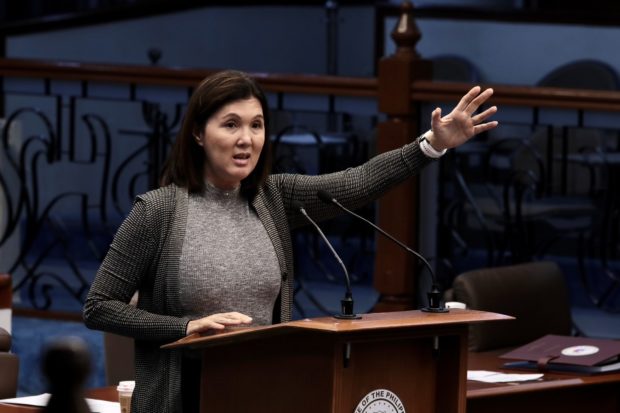
FILE PHOTO: Sen. Pia Cayetano — Voltaire F. Domingo/Senate PRIB
MANILA, Philippines — Local government units should play a bigger role in enticing skilled professionals, especially healthcare workers, to come home and work in their provinces through improving the available benefits and working conditions for them, Senator Pia Cayetano said on Monday.
Cayetano, who presided over the hearing of the Senate panel on sustainable development goals, innovation and futures thinking, raised this idea after hearing from Commission on Higher Education (CHEd) executive director Cinderella Benitez-Jaro that there were already some 900 applicants for the 2022 – 2023 Medical Scholarship and Return Service.
“Of course, the goal here is to have doctors who will return to their provinces once they have graduated,” Benitez-Jaro said.
This prompted Cayetano to cut in, citing her observations in different countries with cities who compete on offering the most optimal benefits and conditions to certain professions like nurses and doctors.
“I’d love to see that LGUs are now saying, ‘Come to my province. Come home to my province because here, we take care of our doctors. We take care of our nurses. Here, we take care of our teachers. These are our benefits for them. We’ll even erect a condominium with a swimming pool.’ Whatever it is that entices them, because that is the gain. Why would they want to come back?” she pressed, speaking partly in Filipino.
Cayetano said there are plentiful benefits that may be expected from living a life in the province, but the favorable conditions offered to professionals in the area remain scarce – enough to deter healthcare workers from serving in their home provinces.
She then took note of a meeting she had with Ateneo de Zamboanga – one of the schools in the country with “the highest retention” of medical students.
“They stay. They really go back to their communities, because their practice, apparently, [starting] from first year includes going to the community, serving the community,” the senator said.
Improving the curriculum by deeply integrating community-oriented training, she noted, may encourage healthcare workers to return to work in their home provinces.
“I’m going to bother with this in the hope and anticipation that we’ll really come up with concrete solutions. Not one, not two but three, five, ten [solutions],” Cayetano said.
She likewise enjoined the LGUs, CHEd, the Department of Health and other concerned agencies to convene after looking into their “spheres of influence” to pin down means of addressing perennial human resources problems in the country’s health sector.